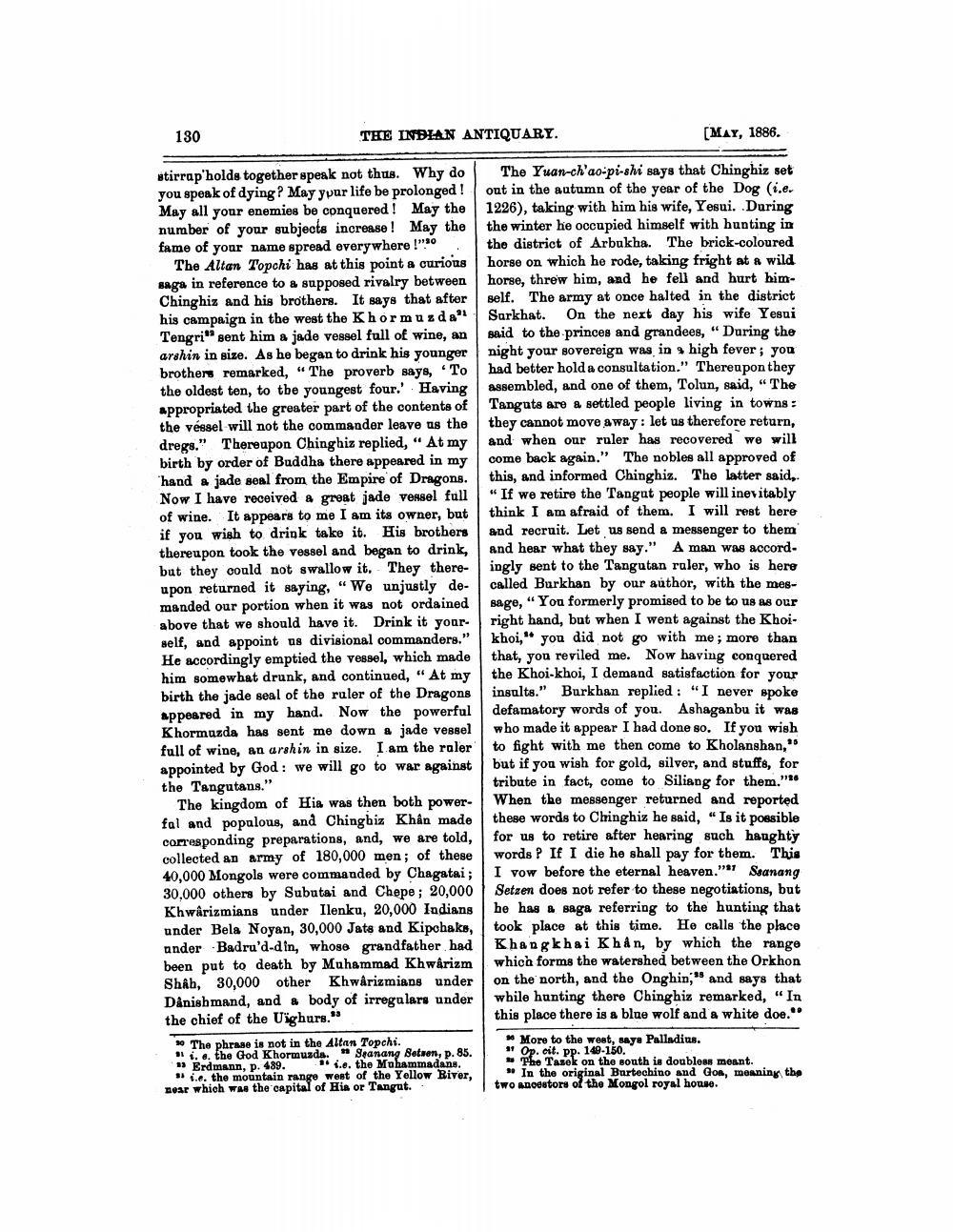________________
130
THE INDIAN ANTIQUARY.
stirrap holds together speak not thus. Why do you speak of dying? May your life be prolonged! May all your enemies be conquered! May the number of your subjects increase! May the fame of your name spread everywhere!"30
The Altan Topchi has at this point a curious saga in reference to a supposed rivalry between Chinghiz and his brothers. It says that after his campaign in the west the Khormuzda" Tengri" sent him a jade vessel full of wine, an arshin in size. As he began to drink his younger brothers remarked, "The proverb says, To the oldest ten, to the youngest four.' Having appropriated the greater part of the contents of the vessel will not the commander leave us the dregs." Thereupon Chinghiz replied, "At my birth by order of Buddha there appeared in my hand a jade seal from the Empire of Dragons. Now I have received a great jade vessel full of wine. It appears to me I am its owner, but if you wish to drink take it. His brothers thereupon took the vessel and began to drink, but they could not swallow it. They thereupon returned it saying, "We unjustly demanded our portion when it was not ordained above that we should have it. Drink it your self, and appoint us divisional commanders." He accordingly emptied the vessel, which made him somewhat drunk, and continued, "At my birth the jade seal of the ruler of the Dragons appeared in my hand. Now the powerful Khormuzda has sent me down a jade vessel full of wine, an arshin in size. I am the raler appointed by God: we will go to war against the Tangutans."
The kingdom of Hia was then both powerfal and populous, and Chinghiz Khân made corresponding preparations, and, we are told, collected an army of 180,000 men; of these 40,000 Mongols were commanded by Chagatai; 30,000 others by Subutai and Chepe; 20,000 Khwarizmians under Ilenku, 20,000 Indians under Bela Noyan, 30,000 Jats and Kipchaks, ander Badru'd-din, whose grandfather had been put to death by Muhammad Khwarizm Shah, 30,000 other Khwarizmians under Danishmand, and a body of irregulars under the chief of the Uighurs."
[MAY, 1886.
The Yuan-ch'ao-pi-shi says that Chinghiz set out in the autumn of the year of the Dog (i.e. 1226), taking with him his wife, Yesui. During the winter he occupied himself with hunting in the district of Arbukha. The brick-coloured horse on which he rode, taking fright at a wild horse, threw him, and he fell and hurt himself. The army at once halted in the district Surkhat. On the next day his wife Yesui said to the princes and grandees, "During the night your sovereign was in a high fever; you had better hold a consultation." Thereupon they assembled, and one of them, Tolun, said, "The Tanguts are a settled people living in towns: they cannot move away: let us therefore return, and when our ruler has recovered we will come back again." The nobles all approved of this, and informed Chinghiz. The latter said,. "If we retire the Tangut people will inevitably think I am afraid of them. I will rest here and recruit. Let us send a messenger to them and hear what they say." A man was accordingly sent to the Tangutan ruler, who is here called Burkhan by our author, with the message, "You formerly promised to be to us as our right hand, but when I went against the Khoikhoi," you did not go with me; more than that, you reviled me. Now having conquered the Khoi-khoi, I demand satisfaction for your insults." Burkhan replied: "I never spoke defamatory words of you. Ashaganbu it was who made it appear I had done so. If you wish to fight with me then come to Kholanshan," but if you wish for gold, silver, and stuffs, for tribute in fact, come to Siliang for them.""" When the messenger returned and reported these words to Chinghiz he said, "Is it possible for us to retire after hearing such haughty words? If I die he shall pay for them. This I vow before the eternal heaven." Ssanang Setzen does not refer to these negotiations, but he has a saga referring to the hunting that took place at this time. He calls the place Khangkhai Khân, by which the range which forms the watershed between the Orkhon on the north, and the Onghin," and says that while hunting there Chinghiz remarked, "In this place there is a blue wolf and a white doe."
1927
so The phrase is not in the Altan Topchi.
1 i. e. the God Khormuzda. Seanang Betsen, p. 85. Erdmann, p. 489. i.e. the Muhammadans. 3 i.e. the mountain range west of the Yellow River, near which was the capital of His or Tangut.
More to the west, says Palladius.
11 Op. cit. pp. 149-150.
"The Tazek on the south is doubless meant.
"In the original Burtechino and Goa, meaning the two ancestors of the Mongol royal house.




